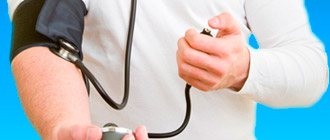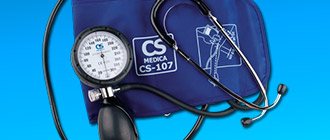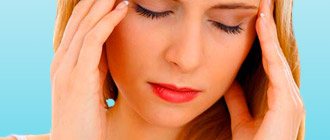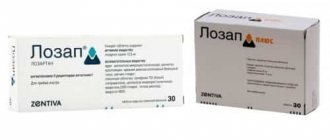Hypotension and hypertension
Types of hypertension
There are 2 types of hypertension - primary and secondary.
A disorder in which an increase in blood pressure occurs exclusively as part of hypertension is called primary hypertension. It is typical for 95% of all patients suffering from high blood pressure. Secondary or symptomatic hypertension is associated with other diseases. Among them:
- kidney inflammation;
- vascular disorders;
- atherosclerosis;
- pathologies of the adrenal glands, pituitary gland, pancreas.
Neurogenic hypertension, formed as a result of neuroses, also occurs. Secondary hypertension often becomes the only manifestation of a hidden disease. Diagnostics helps to identify the true cause and prescribe treatment. It does not involve normalizing blood pressure, but rather influencing the underlying disease.
Features of hypotension
A decrease in blood pressure occurs with high body temperature, significant blood loss, and poor nutrition. Less commonly, hypotension indicates serious diseases - anemia, hormonal disorders. The condition is less dangerous than hypertension and is considered normal for people of asthenic physique.
A dangerous form is acute hypotension, in which severe oxygen starvation of the brain occurs. The man loses consciousness. In this condition there is a high risk of stroke. Acute hypotension is caused by serious diseases - vascular thromboembolism, myocardial infarction, anaphylactic shock. A sharp drop in pressure also occurs during poisoning, dehydration, or blood poisoning.
Chronic hypotension is manifested by periodic headaches and dizziness, especially when moving from a sitting position to an upright position. A sharp drop in pressure causes fainting.
There are also primary and secondary hypotension. The first type is formed as a result of prolonged psycho-emotional stress - stress, depression. It occurs more often in young adults and adolescents.
The secondary form becomes a symptom accompanying complex diseases. Among them:
- cardiovascular diseases;
- cervical osteochondrosis;
- endocrine diseases;
- circulatory disorders;
- brain injuries.
Hypotonic people do not tolerate heat and prolonged periods without movement. Feeling better with physical activity - walking, swimming, etc. Strong tea, coffee, and tonic herbs help maintain normal blood pressure.
Arterial hypotension - symptoms and treatment
During the day, blood pressure changes depending on body position, breathing, stress, physical condition, medications taken, how much a person eats and drinks, and the time of day. Physiologically, BP is usually lowest at night and rises sharply upon awakening.
The human body has certain mechanisms to maintain blood pressure and blood flow at normal levels. These mechanisms are interconnected: the walls of the arteries, determining the level of blood pressure, send signals to the heart, arterioles, veins and kidneys to regulate blood flow. Blood pressure primarily depends on peripheral resistance of blood vessels and cardiac output.
Peripheral vascular resistance is the total resistance of the entire vascular system to the flow of blood that is ejected by the heart into the arteries. The muscle tissue in the walls of arterioles allows these blood vessels to dilate or contract. The stronger the arterioles contract, the higher their resistance to blood flow and the more the blood pressure increases, because in order to push blood through a narrower lumen, more pressure must be applied. Conversely, when arterioles dilate, resistance to blood flow decreases, leading to a drop in blood pressure. The degree of narrowing or dilation of arterioles can be regulated by nerves, hormones, and medications.
At the same time, the regulatory mechanisms of the heart change cardiac output (the amount of blood pumped by the heart into the arteries in one minute). Blood pressure can increase due to increased heart rate and therefore more blood being pumped into the arteries. Veins can dilate, narrow, and deposit (accumulate) more blood. That is, the more blood the heart pumps per minute, the higher the pressure will be, as long as the diameter of the arteries remains unchanged. The volume of blood during each beat depends on the force of contraction and the function of the valves. The total volume of blood in the arteries may depend on the volume of fluid in the body, the volume of fluid removed through the kidneys, and the use of medications.
The kidneys, in turn, respond to these changes by increasing or decreasing the amount of urine excreted, which changes blood volume, affecting blood pressure [6].
All these adaptive mechanisms maintain blood pressure within normal limits.
The physiological tendency towards hypotension and a low pulse in athletes is nothing more than a protective reaction of the body to constant physical activity. With constant exercise that requires endurance, the cardiovascular system undergoes a restructuring: it begins to work in a more economical mode. This hypotension is called high-training hypotension [31].
Theories of the occurrence of pathological AHT
Endocrine. In accordance with this theory, the disease can have adrenal, pituitary and hypothyroid origin. The reasons are:
- decreased synthesis of hormones that increase blood pressure (catecholamines, vasopressin, mineralocorticoids, adrenocorticotropic hormone, thyroid hormones);
- decreased sensitivity of vascular and cardiac receptors to these hormones.
This leads to a decrease in total peripheral vascular resistance, circulating blood volume and cardiac output.
Vegetative theory. According to it, the occurrence of arterial hypotension is associated with an increase in the activity of the cholinergic system and a decrease in the activity of the adrenergic system [4][17]. In this case, the following occurs in blood plasma and daily urine:
- the content of acetylcholine increases, a substance that is involved in the transmission of impulses in different parts of the brain, while its small concentrations facilitate this transmission, and its large concentrations inhibit it;
- the level of catecholamines decreases - active substances that directly or indirectly increase the activity of the endocrine glands, stimulate the hypothalamus and pituitary gland, which are involved in maintaining blood pressure levels.
Neurogenic. According to this theory, under the influence of psychogenic factors there is a change in neurodynamic processes in the cerebral cortex, a violation of the relationship between the processes of excitation and inhibition both in the cortex and in the subcortical autonomic centers [14]. This leads to hemodynamic disturbances, the most important of which is considered to be capillary dysfunction with a decrease in total peripheral resistance. The mechanism for the development of arterial hypotension is to reduce the tonic (contractile) effects of the sympathetic nervous system on the walls of blood vessels and the heart.
The humoral theory suggests that arterial hypotension is caused by an increase in the level of kinins (low molecular weight peptides that cause contraction and relaxation of smooth muscles), prostaglandins A and E (a group of lipid physiologically active substances formed enzymatically in the body), which have a vasodilating effect.
According to the metabolic theory , AHT is associated with a metabolic disorder of substances with hypo- and hypertensive effects. The causes may be dystrophic changes in organs and tissues (due to chronic intoxication, infections, starvation). In this case, the drop in blood pressure is associated with a decrease in the production and/or effects of active metabolites with a hypertensive effect (endothelin, thromboxane A2, angiotensinogen, etc.), a decrease in the tone of the myocytes of the arteriolar walls, and a decrease in the contractile function of the heart muscle. Sometimes the cause is a decrease in water content in the body. Taken together, these factors cause a persistent decrease in blood pressure.
Weather against blood vessels
The fact that meteosensitivity is the first sign of an abnormal pressure level is not a myth, but a real proven fact. You probably yourself have noticed that any change in the weather (it doesn’t matter whether it’s a cold snap or, conversely, a thaw) entails a deterioration in well-being, headaches, and weakness. Meanwhile, doctors have recorded that strokes, heart attacks, and heart attacks occur precisely when weather conditions change. What is the pattern of interaction between us and the planet’s atmosphere? It's simple.
Article on the topic
What causes high blood pressure? 7 facts about hypertension
In hot weather, a lot of water evaporates from the body, and accordingly the density of the blood increases and it thickens. Cold provokes vascular spasms, and as a result - poor circulation. In any case, the heart begins to work with increased tension, which leads to a change in blood pressure. And this causes vascular overstrain. And if the vessels are sick and unstable to external influences, hemorrhage can occur, that is, a stroke.
Where does hypertension lead?
“Hypertension” is translated from Greek as “overtension.” This term most often refers to an increase in blood pressure, which inevitably leads to hypertension.
The approach of hypertension is characterized by weather sensitivity, drowsiness, and weakness when the weather changes. Over time, hypertension threatens to move into a more serious phase, in which there is a deficiency of hormones that regulate the state of the vascular system. That is, the body will completely stop coping with even small temperature changes. The appearance of hypertension can also be preceded by kidney disease, a hereditary factor, age-related changes in blood vessels, and endocrine disorders during menopause.
What do the numbers on the tonometer mean?
First, let's define what is meant by blood pressure? Essentially, this is the pressure of blood on the walls of large arteries. It is measured at two points - the upper (systolic pressure) and the lower (diastolic pressure). The upper point indicates the level of pressure in the blood at the moment of maximum contraction of the heart, while the lower point indicates the level of pressure at the moment of maximum relaxation of the heart.
The higher the blood pressure level, the higher the risk of developing dangerous diseases such as coronary heart disease, stroke, heart attack, kidney failure, and hypertension.
Symptoms of hypotension
They are numerous and varied. Most often, patients complain of weakness (especially in the morning), lethargy, fatigue that quickly sets in during normal activities, headaches, a feeling of lack of air, insomnia, pain in the heart, heaviness in the stomach, and loss of appetite. In addition, there are often stool disorders (usually constipation), menstrual irregularities in women and decreased potency in men.
Externally, patients with hypotension have pallor and sweating feet. When listening and determining the pulse, an unstable pulse and rapid heartbeat are detected. Body temperature in the morning is below 36 °C, blood pressure is always reduced.
Deterioration in health most often occurs in spring and summer, after suffering from colds and infectious diseases.
Myths and facts about blood pressure
In case of any blood pressure disorders, it is necessary to check the thyroid gland. This is true. The thyroid gland, although small, is a very hardworking organ. And even when it fails, you may not always feel it right away. Meanwhile, the lack of its hormones affects the functioning of the heart and can cause a slowdown in its rhythm (less than 60 beats per minute), heart failure, and lower or increase blood pressure.
Instead of doctors, you can seek advice from “experienced hypertensive patients” - they will tell you how to quickly lower your blood pressure. This is the wrong way of thinking. There are more than six different groups of antihypertensive (i.e., blood pressure-lowering) drugs. And each group has its own indications and contraindications for use. Even within the same group, drugs vary greatly in their properties and are selected individually, depending on the dynamics of blood pressure fluctuations, concomitant diseases and the general condition of the person.
Treatment of hypertension leads to impotence in men. This statement is not unfounded. Some drugs designed to treat hypertension cause decreased sexual function. But, firstly, they only reduce libido and have no effect on erectile functions. And secondly, even for such an effect a very long course is needed.
What is normal pressure?
The World Health Organization has compiled a special table that can be used to determine how normal your blood pressure is. Please note: “optimal pressure” is an indicator at which the risk of developing cardiovascular diseases is practically absent.
| Blood pressure category | Systolic (upper) blood pressure mm Hg. Art. | Diastolic (lower) blood pressure mm Hg. Art. |
| Norm | ||
| Optimal | Less than 120 | Less than 80 |
| Normal | Less than 130 | Less than 85 |
| Increased normal | 130–139 | 85–89 |
| Hypertension | ||
| 1st degree (transient) | 140–159 | 90–99 |
| 2nd degree (moderate) | 160–179 | 100–109 |
| 3rd degree (severe) | More than 180 | More than 110 |
| Border | 140–149 | Less than 90 |
| Isolated systolic hypertension | More than 140 | Less than 90 |
What to do at the first signs of weather dependence?
You should dress according to the weather. This is especially true for young people: it is young people who often neglect warm clothes in the cold season for the sake of fashion, after which they begin to suffer from headaches.
Take precautions when solar activity is high (especially if you like to sunbathe, choose safe hours). Also try not to stay in the cold for long - you can freeze without even noticing it. If your head starts to hurt, you can wash your face alternately with warm and cold water, and rinse your feet with a contrast shower. This will allow the vessels to return to tone. Also, contrast procedures (without fanaticism) are recommended for the prevention of vascular problems.
You should not get carried away with strength training equipment, hardening and exercises (especially bending). Such entertainment causes sudden changes in pressure in the body and leads to the opposite effect.
Oddly enough, optimists tolerate weather changes much better than pessimists, which means their cardiovascular system is healthier. This is due to the fact that positive emotions stimulate the production of sex hormones in the body, and they play a huge role - they influence neurotransmitters, that is, substances that are responsible for brain activity, memory, activity, and speech. If there are few of them, then the person seems to slow down in his life rhythm; with their increase, the person becomes more active.









